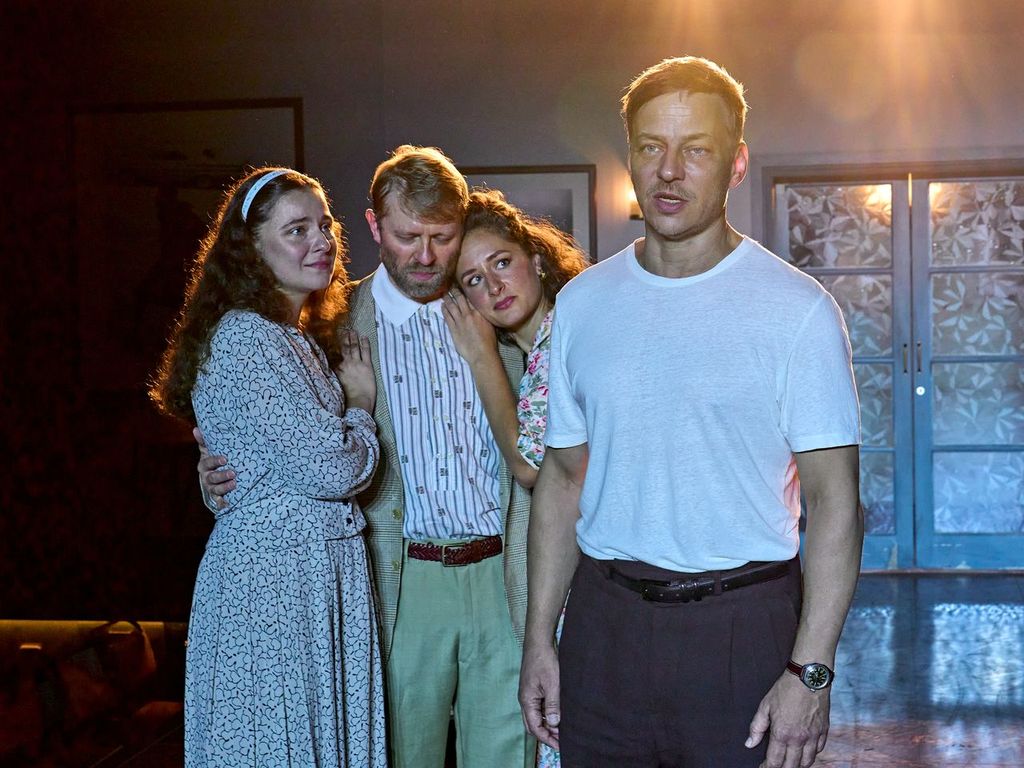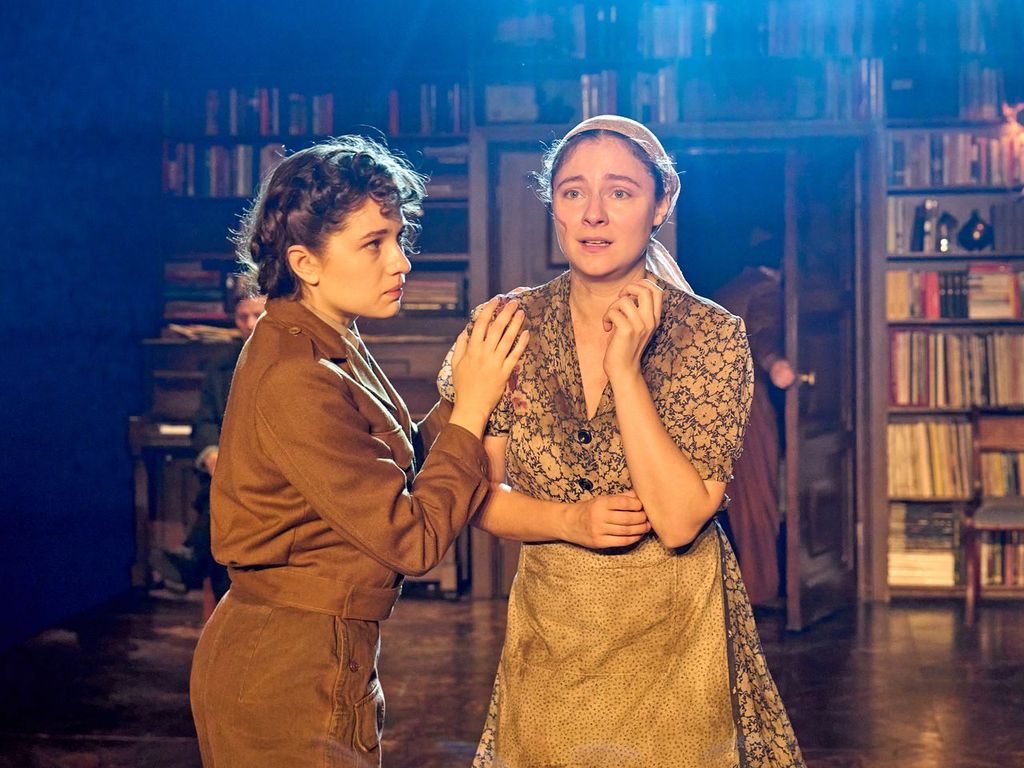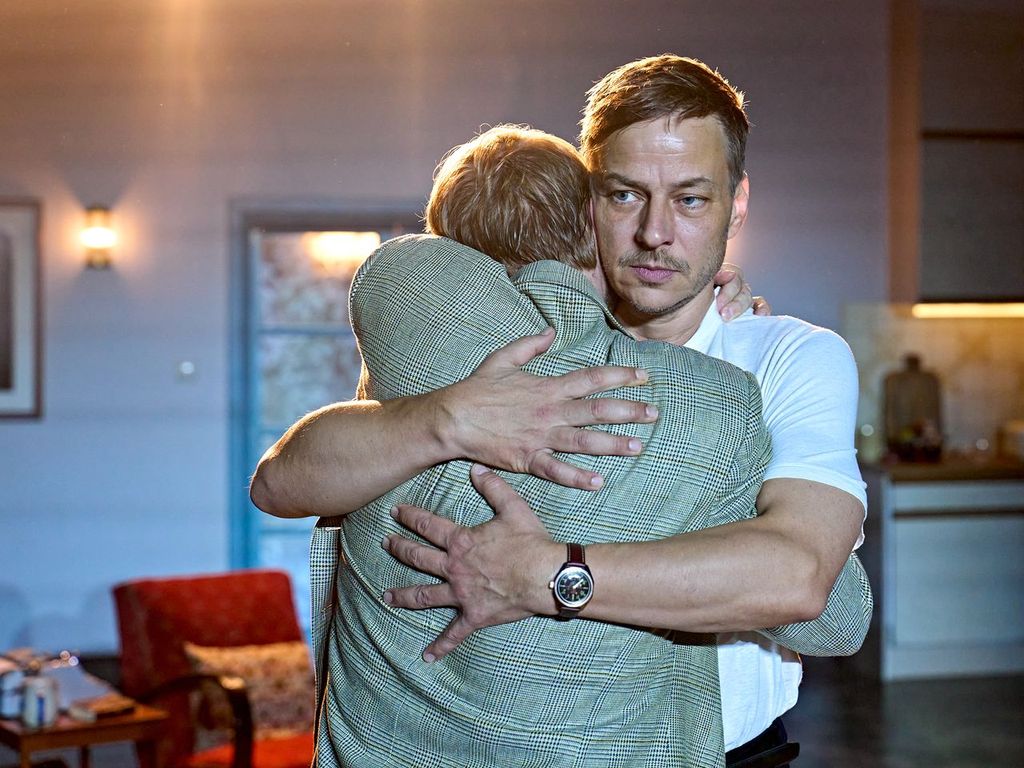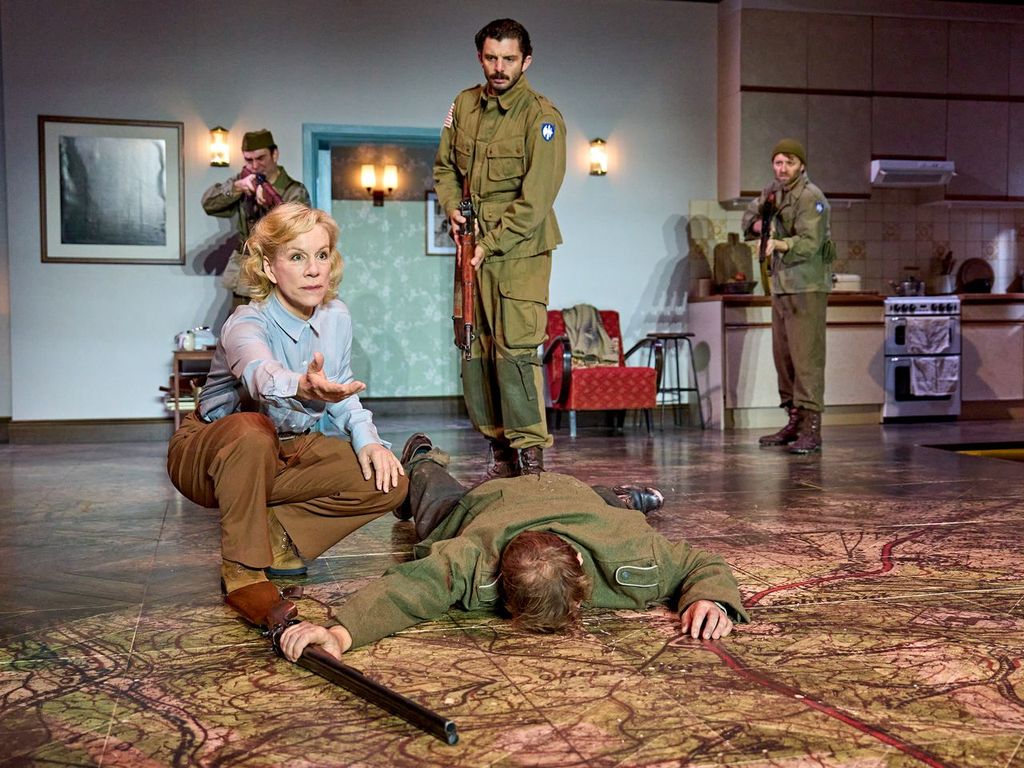Review by Simon Jenner, September 18 2025
*****
“I want to be clear, I’m not at all angry” says Thomas angrily at the start. Nothing here though prepares you for the power of David Lan’s The Land of the Living directed at the National Theatre’s Dorfman by Stephen Daldry till November 1st, in a cast led by Juliet Stevenson as Ruth, and Tom Wlaschiha as Thomas.
With Russians abducting Ukrainian children these past three-and-a-half years, this drama of abducted and repatriated children, split between 1945 and 1990 has an all-too-relevant feel. Only in 1945, it wasn’t just Soviet Russians abducting – and repatriating – any children they deemed fit for their extended European empire. It was of course Germany which began this kidnapping and displacement. And America wasn’t innocent. Which impulse fed directly into their role in the abduction of so many Irish children from the 1950s onwards.

Cosima Shaw, Hubert Hanowic, Sasha Syzonenko, Tom Wlaschiha. Photo Credit: Felicity McCabe
The work of UN staff in Europe after the war to locate and repatriate many millions of displaced people, is forgotten. Based on real accounts, notably by Gitta Sereny, in whose memory the play is dedicated, Lam’s work is fictional only in essence. With a cast of 14, it starts intimately. Thomas has tracked and confronted former UN aid worker Ruth in 1990, to ask why she made the decision she did about him; to whom he was special. Which was of course against the rules. Thomas, a child adopted by German parents, may have been abducted at five years old (in 1940 which narrows it a bit) from conquered territory. His parents might still be alive and searching. Ruth’s just 20 herself “still a child” she reasons to Thomas. And Elise as her Alsace-based mother (something we never quite unravel) points out, Ruth mightn’t know in her right-mindedness, that it’s who brings up the child, that the child might want to stay with. Elise (Caroline Loncq) laconically counters Stevenson’s earlier self. Ruth’s not unheedful of either this or young Thomas’s preference. But as Thomas points out, was he in a position to choose either? Loncq later has an inspired moment at the piano, in a small gem of a scene.
There’s no simple wrong decision to dandle guilt in, and no right one that would illumine Ruth’s decision. Indeed complicating factors are unskeined as the two relive the narrative, where the other twelve cast members rush across Miriam Beuther’s traverse set solidly bookended by a bookcase, upright piano (much played) on one end; and a full kitchen range right across at the other. Noirishly lit by James Farncombe, everything with long tables doing service for a train, smoke, a child’s bed and cameras festoon the raised level. Even below, facing the audience, box-files and records jut, with boxes evoking the Grenfell play of two years ago. The A row seats are swapped for old chairs. Between this and the normal seating behind actors run across; you keep your toes in. They’re usually UN workers in a bright khaki. Various greens constitute a sort of vivid sepia in period costumes by Nicky Gillibran contrasting with the 1990 grey-green-blue cool of Stevenson and Wlaschiha.
Stevenson herself dons khaki interacting with her two colleagues. They’re “robust but not clear” deputy, Salvation Army Dora (Kate Duchene), and “clear but not robust” actor Theresa (Anastasia Martin) fluent in several languages, as is Ruth. They support and cajole, and with Dora warn of consequences, with Elsie alert to nuance. It’s a trio evoking camaraderie amidst chaos, shuffling off hell for some step by step; or document by document.
They’re joined by American photographer Bill (Michael Marcus), with whom Ruth starts an affair and has (we know in 1990) been married to since. He’s ympathetic, willing to take risks, though even he has his conceptual limits about the American capacity to think it’s doing good. He’s countered by charming but ultimately bullish American officer George (a racy, yet shadowy Michael Fox), and Ruth’s peremptory oppo Soviet Olga (Avital Lvova) demanding all children be handed over, even though this is the American sector. They’re prepared to raid to get what they want. There’s women who wait like Ukrainian Anna (Sasha Syzonenko), and a range of complicit and recently-appointed Mayors (Attila Akinci breathing the “I know nothing” kind).
Thomas’ brother Pawel (Hubert Hanowicz also particularly moving as a Free Polish soldier both praying and singing too), Thomas’ Father (Marek Oravac), Thomas’ Mother (Cosima Shaw) mostly take small roles earlier, but the final tableau is in itself absorbing: Thomas baulks at choices but as the full narrative plays out, it’s by no means clear what the right one is: Thomas surprises Ruth with another option altogether. And we’re not sure of what choice was made till the end.

Anastasia Martin and Sasha Syzonenko. Photo Credit: Felicity McCabe
Thomas springs surprises but then so does Ruth. This work keeps unfolding them to the last minutes. We’re gradually introduced to the fact that Thomas is an internationally famous concert pianist, particularly strong in improvising on classical pieces. And Wlaschiha can play the piano with real accomplishment, riffing on works like Bach’s chromatic fantasy, with music composed by Paul Englishby. This extends to a cappella singing and a moving chorus of the Polish national anthem, that finds its way into the piano later. Gareth Fry’s sound extends to a pelting canopy of train whistles and explosions. It’s the largest world I can remember in the Dorfman, yet everything’s swept clear and bar the bookends, the heinous detail of box files is all below, at audience level.
On this occasion young Thomas is played Artie Wilkinson-Hunt. Nothing in my experience of child acting – or indeed of those I spoke to – can prepare us for his performance. Often mute, Wilkinson-Hunt’s capable of wreaking havoc: smashing chairs, running riot, speaking at least two languages and finally playing the piano. His is a phenomenal performance. Elsewhere young Thomas will be portrayed by Platon Filatov, Darcy Tosun, Anton Vehring.
Lan’s stagecraft and layering is consummate (as you might expect, given his career). Though it’s a shock to realise he’s produced no original play for nearly 30 years since The Ends of the Earth, also at the National in 1996. That too themed a search for lost kin. There are moments in dialogue I didn’t catch and was grateful for a text. That aside, over three hours (despite its nominally two hours forty-five) Lan’s drama completely absorbs, with its fluid and simultaneous timelines lucidly presented.
Stevenson and Wlaschiha are outstanding, with Wlaschiha’s piano playing part of the many layers this company reveals in uniformly consummate performances. Stevenson transitions effortlessly from a woman of 65 to her 20-year-old self, without specifically invoking youthfulness. There’s a mix of downrightness, bewilderment and desperate improvisation breaking through the rationale of compassionate procedure. Wlaschiha simmers resentment yet compassion breaks through. When he too evokes the past there’s vulnerability and hurt, and finally wonder. Duchene impresses with awkward, slighted but enduring Dora, full of good sense. Marcus as someone who risks for Ruth yet shows liberal limits, is poised on what he’ll dare. Martin breathes a question-mark with urgency and a riff of fun.
The Land of the Living is a profound but at the same time magnificently theatrical enquiry on the nature of war’s displacement, kinship, bonds of amity and lost – and found – family. It asks what transcends nurture, as we discover. The most moving and theatrically gripping new play I’ve seen for a long time, it’s also the most layered and completely realised. A world that invites ours to ask where on earth we come from.
Movement Director Paul McGill, Fight and Intimacy Director Maisie Carter, Casting Naomi Downham, Dialect and Language Victoria Woodward, Voice Coach Cathleen McCarron, Associate Director Jane Moriarty, Staff Director Julia Levai.
Juliet Stevenson and Tom Wlaschiha. Photo Credit: Felicity McCabe



